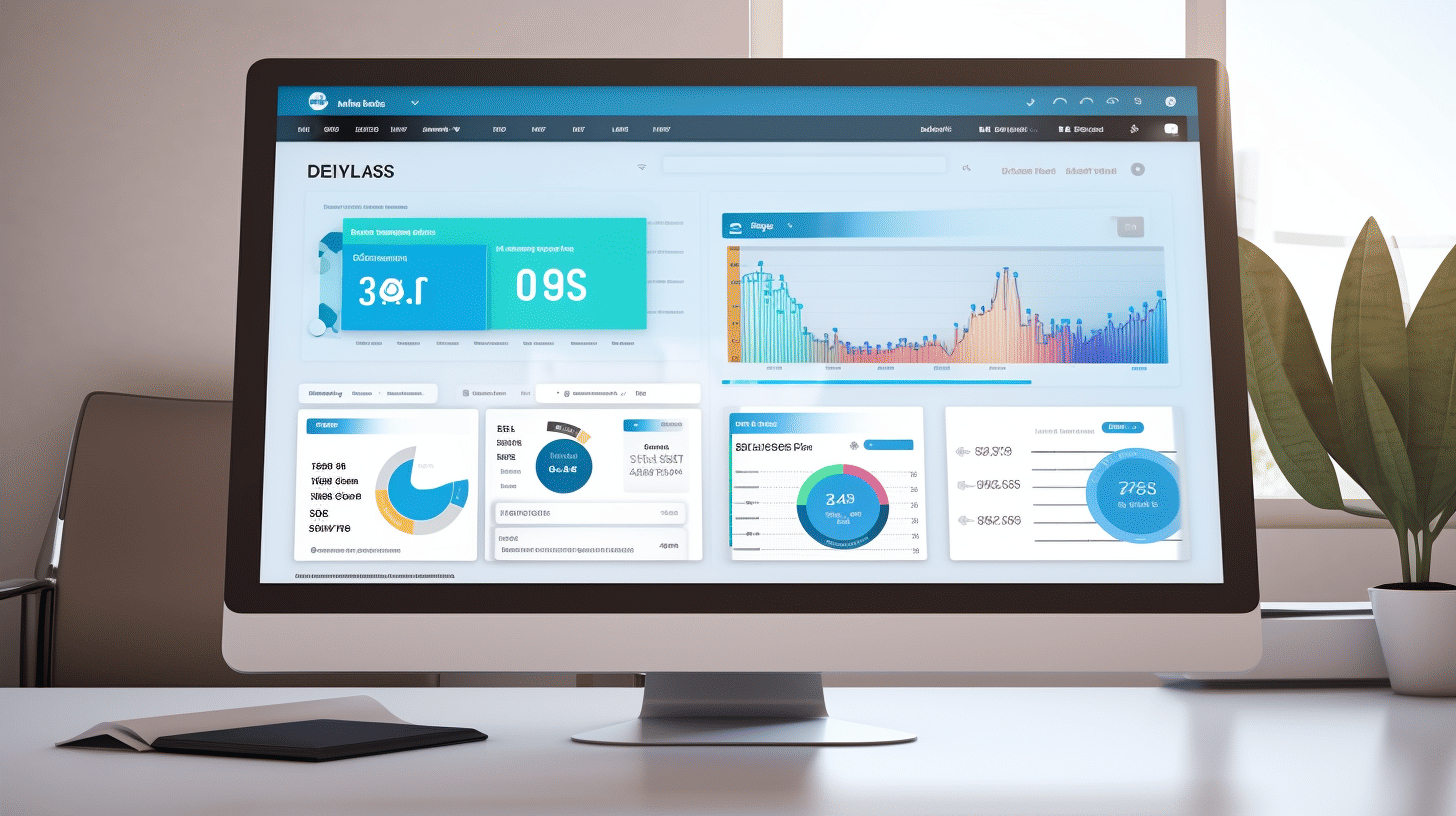在當今的數位環境中,維護網站不再是一次性的任務。需要持續的努力和關注才能確保您的線上狀態保持安全、最新且對您的受眾具有吸引力。身為 IT 經理,您的職責不僅限於網站的初始開發。您還必須考慮定期更新、SEO優化、內容管理和使用者體驗增強。
但要從哪裡開始呢?由於需要管理的因素太多,要有效地處理好所有事情可能會讓人難以承受。這就是我們在這裡為您簡化網站維護的原因。在本文中,我們將探討專家的解決方案和策略,以協助您簡化流程並確保您的網站順利運作。
無論您是網站維護新手還是已經處理了一段時間,本綜合指南都將提供有價值的見解和可操作的提示,以確保您的網站保持優化、安全和吸引力。從了解定期更新的重要性到掌握 SEO 審核、內容優化和網站載入速度,我們為您提供每一步的協助。
那麼,讓我們深入研究如何簡化網站維護、節省時間和資源並最終增強您的線上形象。現在是時候掌控並釋放您網站的全部潛力了! 🚀
定期更新網站的重要性
在當今的數位時代,網站是企業的線上門面,保持網站的最新狀態比以往任何時候都更加重要。定期更新可確保安全性、效能並提供新鮮且引人入勝的內容,有助於網站的整體成功。讓我們來探討一下定期更新網站如此重要的兩個主要原因。
安全性和性能
定期更新網站軟體(例如內容管理系統 (CMS)、外掛程式和主題)對於安全性和效能至關重要。原因如下:
- 安全: 駭客和網路犯罪分子不斷在網站軟體中發現新的漏洞。透過保持您的網站軟體為最新版本,您可以確保安裝了最新的安全修補程式和修復程序,從而降低安全漏洞的風險。
- 表現: 過時的軟體可能會降低您的網站速度。每次更新通常都包括效能改進,旨在使您的網站加載更快,改善用戶體驗和搜尋引擎排名。
定期更新不僅可以增強您網站的安全性和效能,還可以幫助您領先一步防範潛在的網路威脅。
新鮮有趣的內容
內容過時的靜態網站很快就會失去其吸引力和可信度。定期更新可讓您的網站保持新鮮感並吸引訪客。方法如下:
- 部落格文章: 定期添加新的部落格文章可以保持受眾的參與度,並表明您的業務活躍且最新。它還提供了展示您的專業知識、分享寶貴見解並吸引來自搜尋引擎的自然流量的機會。
- 產品更新: 如果您經營電子商務網站,定期更新可讓您更新產品說明、新增產品並刪除過時的產品。這不僅可以使您的庫存保持最新,而且還確保您的客戶擁有有關您的產品的準確資訊。
- 視覺效果與設計: 更新圖像、視覺效果和設計元素可以讓您的網站煥然一新。這有助於保持訪客的興趣並確保您的網站在競爭對手中脫穎而出。
透過將定期網站更新納入您的維護程序,您可以提供無縫的用戶體驗,並向訪客展示您的企業是活躍的、值得信賴的並且致力於卓越。
請記住,定期更新不僅限於您網站的視覺方面。它涉及定期審查和更新您的網站的內容、功能和安全措施。
要了解有關簡化網站維護的更多信息,以及針對時間緊迫的企業主的其他寶貴建議,請查看 網站維護技巧 在託管 WP 上。
SEO 審核和優化
介紹:
在當今的數位環境中,擁有強大的線上影響力對於任何網站的成功至關重要。實現此目標的關鍵方面之一是針對搜尋引擎優化您的網站。 SEO 審核和優化對於提高您網站的搜尋引擎排名和知名度起著至關重要的作用。透過定期審核和實施優化策略,您可以確保您的網站在搜尋引擎結果中排名更高,從而為您的網站帶來更多的自然流量和潛在客戶。
提高搜尋引擎排名:
提高搜尋引擎排名是SEO審核和優化的主要目標。透過優化您網站的各種頁面內和頁面外元素,您可以提高其對 Google 等搜尋引擎的可見度。以下是審計和優化可以產生重大影響的一些關鍵領域:
- 關鍵字研究與優化: 確定正確的關鍵字並策略性地將其融入您的網站內容中至關重要。進行徹底的關鍵字研究可以讓您了解目標受眾使用哪些術語來搜尋與您的類似的產品或服務。透過使用相關關鍵字優化您網站的內容,您可以增加您的網頁在搜尋結果中排名更高的機會。
- 頁面優化: 頁面優化著重於優化網站本身的元素。這包括優化元標籤、標題標籤、URL 結構,並確保您的內容易於閱讀且用戶友好。透過微調這些頁面元素,搜尋引擎可以更好地理解網頁的內容和上下文,從而提高排名。
- 技術搜尋引擎優化: 技術 SEO 涉及優化您網站的各個技術方面以提高其搜尋引擎效能。這包括優化網站速度、修復斷開的連結、提高行動響應能力以及確保正確索引您的網頁。技術 SEO 在提供無縫用戶體驗方面發揮著至關重要的作用,搜尋引擎在對網站進行排名時會優先考慮這一點。
- 連結建設: 從信譽良好的網站建立高品質的反向連結是提高搜尋引擎排名的另一個重要方面。透過獲取自然和相關的鏈接,搜尋引擎會將您的網站視為權威的資訊來源,從而獲得更高的排名。進行反向連結分析並實施連結建立策略可以顯著影響您的網站在搜尋引擎結果中的可見性。
WordPress 的 SEO 外掛:
說到 WordPress 網站,有幾種 SEO 外掛程式可用於幫助您進行審核和優化您的網站。這些外掛提供了有用的功能和工具來簡化最佳化過程。 WordPress 的一些頂級 SEO 外掛程式包括:
- 搜尋引擎優化出版社:SEOPress 是一個全面的 SEO 插件,提供廣泛的功能,如 XML 站點地圖生成、元標記的輕鬆優化和社交媒體整合。
- 優斯特蒐尋引擎優化:Yoast SEO 是一款流行的插件,以其用戶友好的介面和強大的優化功能而聞名。它為提高內容可讀性、優化元標籤和生成 XML 網站地圖提供了建議。
- 排名數學:Rank Math 是一款功能豐富的 SEO 插件,可提供 404 錯誤監控、重定向管理和本地 SEO 優化等進階功能。
如果有效使用,這些外掛程式可以大大幫助優化您的 WordPress 網站,以獲得更好的搜尋引擎排名。
總而言之,定期進行 SEO 審核和優化對於提高您網站的搜尋引擎排名至關重要。透過專注於關鍵字研究、頁面優化、技術搜尋引擎優化和連結建設,您可以提高網站在自然搜尋結果中的可見度。此外,利用 WordPress 的 SEO 外掛可以簡化優化過程,使其更有效率、更有效率。因此,不要忽視 SEO 審核和優化在提升您的網站在搜尋引擎結果中的表現和可見性方面的力量。
內容更新與優化
在快節奏且不斷變化的數位環境中,保持網站內容的更新和優化對於吸引和吸引用戶至關重要。定期更新您的內容不僅可以保持其新鮮度和相關性,還可以向搜尋引擎表明您的網站活躍且提供有價值的資訊。
那麼,如何確保您的內容保持吸引力和最新性呢?以下提示可協助您優化網站內容並吸引使用者再次造訪:
- 進行定期審核: 定期進行內容審核可以讓您識別需要更新或刪除的過時或不相關的內容。全面了解您的網站並評估每個頁面的品質、相關性和效能。此過程將幫助您發現任何內容差距並確保您的網站提供無縫的用戶體驗。
- 掌握產業趨勢: 隨時了解您所在行業的最新趨勢和發展。這些知識將幫助您創建及時且相關的內容,引起目標受眾的共鳴。考慮在您的網站上設立一個專門發布行業新聞或部落格文章的部分,以提供對新興趨勢的見解。
- 針對搜尋引擎進行優化: 將相關關鍵字策略性地納入您的內容中,以提高其在搜尋引擎結果頁面上的可見度。確定目標受眾用於搜尋與您的行業或利基相關的資訊的關鍵字,並圍繞這些關鍵字創建內容。記住要自然地寫作並避免關鍵字堆砌,因為搜尋引擎優先考慮高品質、用戶友好的內容。
- 利用多媒體: 透過加入多媒體元素(例如圖像、影片和資訊圖表)來增強內容的視覺吸引力。這些元素不僅使您的內容更具吸引力,而且還有助於分解長段文字,提高可讀性。此外,透過添加 alt 標籤和描述性標題來優化多媒體文件,使其適合搜尋引擎。
- 鼓勵用戶互動: 透過鼓勵評論、評價和社交媒體分享來吸引您的受眾。當用戶與您的內容互動時,它會增加整體參與度並向搜尋引擎發出信號,表明您的內容很有價值。及時回覆評論和評價,並鼓勵討論以培養品牌周圍的社區意識。
透過實施這些內容更新和優化策略,您不僅可以吸引更多用戶造訪您的網站,還可以讓他們參與並再次造訪您的網站。請記住,一致性是關鍵,因此請養成定期檢查和更新內容的習慣,以便在不斷發展的數位環境中保持相關性。 🚀
網站載入速度
在當今快節奏的數位世界中,人們的注意力持續時間比以往任何時候都短,網站載入速度對於任何線上業務的成功都起著至關重要的作用。載入時間緩慢會讓使用者感到沮喪並導致他們放棄網站,從而影響使用者體驗和轉換率。這就是為什麼網站載入速度優化是 IT 經理和 Web 開發人員的首要任務。在本節中,我們將探討網站載入速度的重要性以及它如何提升使用者體驗。
對速度的極品
對網站來說,速度很重要。原因如下:
- 使用者體驗:快速的網站可提供流暢、無縫的使用者體驗。用戶希望網站能夠在眨眼間加載完畢,而緩慢的加載時間可能會導致高跳出率和對您的品牌的負面印象。
- 搜尋引擎優化排名:像 Google 這樣的搜尋引擎在對網站進行排名時會考慮載入速度。載入速度更快的網站往往在搜尋結果中排名更高,從而帶來更多自然流量並提高知名度。
- 行動最佳化:隨著行動瀏覽的興起,優化行動裝置的網站速度至關重要。行動用戶經常處於忙碌狀態,對於載入緩慢的網站,他們的時間和耐心有限。
需要更快的網站
為了確保您的網站速度極快,請考慮以下優化技術:
- 優化影像:大型圖像檔案可能會嚴重減慢您的網站速度。在不影響品質的情況下壓縮和調整影像大小,以減少檔案大小並縮短載入時間。
- 縮小 CSS 和 JavaScript:透過刪除不必要的字元和空格來縮小網站的 CSS 和 JavaScript 檔案可以提高載入速度。
- 啟用瀏覽器快取:在您的網站上啟用緩存,以便在用戶的瀏覽器上儲存靜態文件,例如圖像和 CSS。這減少了伺服器請求的數量,從而縮短了回訪者的載入時間。
- 減少 HTTP 請求:透過將多個 CSS 和 JavaScript 檔案合併為一個來最大限度地減少 HTTP 請求的數量。這減少了網頁載入所需的時間。
- 內容傳遞網路 (CDN):實施 CDN 可以將您的網站內容分發到世界各地的各個伺服器上,從而允許使用者從距離他們最近的伺服器訪問您的網站。這減少了延遲並縮短了載入時間。
監控和優化
評估並持續監控您的網站的載入速度對於確定需要改進的領域至關重要。 IT 經理可以採取以下方法來優化網站載入速度:
- 網站速度測試工具:使用 Google PageSpeed Insights 或 GTmetrix 等網站速度測試工具來分析您網站的效能並確定需要優化的領域。
- 定期績效審計:定期進行效能審核以評估您網站的載入速度並找出可能影響效能的任何瓶頸。
- 保持最新狀態:保持您的網站的軟體、外掛程式和腳本為最新版本。過時的版本可能會降低您的網站速度並帶來安全風險。
- 行動最佳化:確保您的網站針對行動裝置進行了最佳化,因為行動用戶佔網站流量的很大比例。響應式設計和行動友善功能對於最佳行動載入速度至關重要。
透過優先考慮網站載入速度、優化效能並跟上最新趨勢和技術,您可以建立一個快速且反應迅速的網站,以增強用戶體驗並推動業務成長。
請記住,快速的網站會帶來快樂的網站,快樂的網站會帶來快樂的使用者! 🚀
常見問題解答
- 為什麼網站維護很重要?
網站維護對於確保您的網站順利運作、保持最新、安全和效能優化非常重要。它有助於解決問題、改善用戶體驗並維護專業的線上形象。
- 一些常見的網站維護任務有哪些?
常見的網站維護任務包括更新軟體和外掛程式、檢查斷開的連結、優化網站速度、備份資料、監控安全性、管理使用者帳戶以及定期審查和更新內容。
- 我應該多久進行一次網站維護?
網站維護的頻率取決於您的網站的複雜性和大小、訪客數量以及內容更新頻率等因素。通常,建議每月或每季進行維護,但對於較大的網站來說,更頻繁的檢查是理想的。
- 我可以在沒有技術專業知識的情況下自己處理網站維護嗎?
是的,您無需技術專業知識即可處理基本的網站維護任務,例如更新內容或外掛程式。但是,對於更複雜的任務,如伺服器管理、安全審計或修復編碼問題,建議尋求專業協助或聘請網站維護服務。
- 外包網站維護有哪些好處?
將網站維護外包給專業服務提供者可以帶來許多好處,例如擁有專業知識、節省時間、定期備份和安全更新、提高網站效能、獲取最新技術和行業最佳實踐以及安心。



















